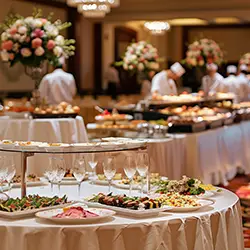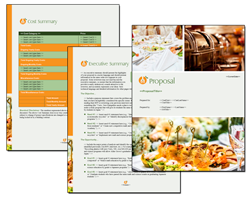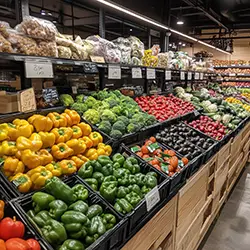
The Best Guide on How to Write a Food Industry or Catering Business Proposal
To write a food industry or catering business proposal, you must communicate your services, pricing, and unique value to potential clients. In this guide, you'll learn practical steps to write a food industry or catering business proposal, understand client needs, structure your proposal, and highlight your offerings to stand out. Follow these guidelines to create a proposal and increase your chances of winning more catering contracts. A catering proposal template can help you structure and format the proposal more efficiently.
Key Takeaways
- A catering business proposal must present services, costs, and unique offerings tailored to the client's specific event needs to persuade potential clients.
- Structuring the proposal with key components such as an executive summary, detailed service descriptions, and a clear cost breakdown enhances clarity and builds client trust.
- Incorporating visually appealing designs and using a catering proposal template can significantly improve engagement and professionalism, making the proposal more memorable and impactful.
Understanding the Purpose of a Catering Business Proposal

A catering business proposal primarily aims to introduce services, highlight products, describe costs, and convince clients to choose your catering services over competitors. It's not just about listing what you offer; it's about presenting it in a way that aligns with the client's needs and expectations. The proposal is a professional document outlining your catering services, estimates, and terms, making it an important tool for persuading potential clients.
One of the essential purposes of a catering proposal is to identify how your services fit the client's specific needs. For instance, if a client is planning a wedding, your proposal should highlight your experience with wedding catering, the unique touches you can bring to their event, and how your services will make their special day unforgettable. This approach showcases your offerings and demonstrates your understanding of the client's vision and requirements. A clear restaurant concept can help align the proposal with client needs and expectations by ensuring your services resonate with the target market's demographics and preferences.
Moreover, a well-structured catering proposal can set you apart from your competitors. Highlighting specific advantages such as affordability, uniqueness, or specialized services can make your proposal more appealing. Including quotes for services, terms of payment, and detailed descriptions of your products helps build transparency and trust with potential clients.
Ultimately, your catering proposal aims to convince potential clients that you are the best choice for their event, providing them with all the necessary information to make an informed decision.
Structuring Your Proposal
A well-structured catering business proposal is important for clearly communicating your value proposition to potential clients. The major components of a catering proposal typically include an introduction, a summary of client needs, a description of services and costs, and comprehensive company information. Each section should be organized and detailed, ensuring the proposal flows logically and is easy to navigate. Additionally, a food business proposal can enhance your offerings and attract more clients. A solid business plan is also crucial for a restaurant venture to secure financing from banks or investors, as it provides the necessary capital for successful operation and longevity.
Including comprehensive company information and credentials is crucial for building trust with prospective clients. This section should highlight your company's history, capabilities, and any certifications or awards demonstrating your expertise in the restaurant, food, and catering industries.
Effectively structuring your proposal ensures that each section serves its purpose, creating a professional document that stands out to potential clients and is easy to follow.
Cover Letter and Title Page
The cover letter and title page are the first things a potential client will see, so making a strong first impression is crucial. A beautiful design can set the tone for the entire proposal, showcasing your professionalism and attention to detail. The cover letter should provide a brief personal introduction, an overview of your company, and a statement of intent. It should also convey your enthusiasm for catering the client's event.
The title page should include your company logo, contact information, and visually appealing topics such as colored page borders, interesting fonts, and custom bullets. These design touches enhance the document's visual appeal and reinforce your brand identity.
A well-designed cover letter and title page set the stage for a professional and engaging proposal, capturing the client's attention from the outset.
Executive Summary

The executive summary is an important part of your catering business proposal, providing a concise overview of your business's vision and key offerings. This section should capture the essence of your proposal, offering a snapshot of your services, value proposition, and what sets you apart from competitors. An effective executive summary entices potential clients or investors by clearly stating your catering services' main goals and highlights.
Emphasizing key offerings and unique selling points in the executive summary creates an argument for why clients should choose your services, especially when considering the target market. This section should be engaging and informative, giving the reader a clearer idea of what to expect from the rest of the proposal.
Creating a solid executive summary lays the groundwork for a persuasive and memorable proposal that stands out to potential clients.
Highlighting Client Needs
Understanding and highlighting client needs is a cornerstone of a successful catering business proposal. Tailoring each proposal to the client's needs increases the likelihood of acceptance, showing that you have taken the time to understand their unique requirements. Conducting a thorough consultation with clients helps gather essential details such as the event date, location, and budget, which can be incorporated into the proposal to make it more relevant and appealing.
Tailoring the proposal to the client's needs demonstrates your ability to provide personalized and attentive service. This can involve detailing how your services align with the client's expectations and offering solutions to meet their requirements. For example, highlighting your ability to accommodate dietary restrictions can significantly enhance the proposal's appeal if a client is looking for gluten-free menu options. Showing that you have gathered information about their needs and tailored your proposal accordingly establishes credibility and authority.
Using clear and persuasive communication is essential in conveying your value to the client. Demonstrating an understanding of the client's pain points and offering solutions that address these concerns can make your proposal more compelling. Focusing on client needs builds trust and creates a proposal that stands out for its relevance and attention to detail.
Detailed Service Descriptions

Outlining detailed service descriptions in your catering proposal is vital for providing transparency and managing client expectations. Comprehensive service offerings can increase the appeal of your proposal by including unique topics such as upscale plating and vendor partnerships. It's essential to balance the level of detail and provide enough information to inform the client without overwhelming them.
Detailed service descriptions should include information on:
- food choices
- event schedules
- reception durations
- the number of guests
Additionally, presenting descriptions and photos of the menu items gives clients more options and enhances their engagement with your proposal.
Clearly outlining your services helps clients understand how your offerings align with their needs, creating a case for choosing your catering services.
Menu Selections
Menu selections are an important part of any catering proposal. Including precise details of menu items ensures clarity and variety for the client. Visual representations of menu items can significantly enhance client engagement and interest in your food options. Quality catering services are marked by their ability to meet client expectations and maintain high standards of organization.
Considering the client's preferences and dietary restrictions is essential when presenting menu selections. Offering gourmet, inventive alternatives that accommodate specifications such as gluten-free, dairy-free, egg-free, and nut-free options can make your proposal more appealing. Free samples of menu items can also help clients make informed decisions and increase their confidence in your services.
Additional Services

Highlighting additional services in your catering proposal showcases the comprehensive nature of your offerings. Services such as labor, linens, silverware, entertainment, and event rentals can enhance the overall appeal of your proposal by demonstrating your ability to provide a complete event solution. Personalized table arrangements and distinctive settings can create inviting and memorable client environments.
Detailing these additional services adds value to your proposal and helps potential clients understand the full scope of what you can offer. This transparency can build trust and make your proposal more attractive to clients looking for a one-stop solution for their event needs.
Cost Breakdown and Pricing
A clear and detailed cost breakdown is essential in a catering business proposal to prevent surprises for clients during billing. Transparent communication of the pricing structure helps clients understand all associated charges and aligns their expectations with their budget. A detailed breakdown of costs, including staff, transportation, and preparation, enhances transparency and builds client trust.
Understanding market demand and setting competitive pricing is crucial for attracting clients. Different pricing methods, such as charging per hour, selling in quantities, or offering optional up-sell products, can be implemented based on the client's needs and budget. Offering discounts, event packages, and bulk rates can help clients manage their budgets while ensuring your services remain attractive and competitive.
It's important to present the total charges clearly and explain the purpose of each cost item to help clients understand what they are paying for. Using templates and line item quoting software such as those in the Proposal Kit can aid in presenting an organized overview of pricing and services, making the proposal more straightforward and professional. A comprehensive cost breakdown ensures clients have all the information they need to make an informed decision.
Company Information and Credentials
Including comprehensive company information and credentials in your catering business proposal is essential for establishing trust and showcasing your capabilities. This section should feature topics such as your company's history, capabilities, testimonials, and references. Detailed information about your legal position, short- and long-term objectives, and contact information helps build credibility and confidence in your services.
Highlighting the combined work experience of your team members demonstrates your team's qualifications and expertise. Additionally, showcasing safety plans and certifications reassures clients about your professionalism and commitment to quality. Including all this information creates a strong foundation for your proposal, making it more appealing to potential clients.
Team Profiles
Highlighting team profiles in your catering proposal showcases your team's expertise and reliability. Investors and clients look for a well-rounded team with relevant experience, and detailed profiles of team members can provide a comprehensive view of your team's capabilities. Each profile should include the team member's experience, roles, tasks, and notable contributions to the company.
Detailing each team member's specific roles and contributions demonstrates your team's collective expertise and builds confidence in your ability to deliver high-quality catering services. This transparency can enhance the appeal of your proposal and make it more attractive to potential clients.
Certifications and Quality Control

Showcasing certifications and quality control measures in your catering proposal is crucial for building client trust. Providing details about your ability to handle volume and safety requirements, such as your Requirements, Facilities, Safety Plan, Training Plan, Certifications, and Quality Control, demonstrates your commitment to professionalism and quality.
Highlighting these topics reassures clients that you have the necessary expertise and infrastructure to deliver safe, high-quality catering services. This information can significantly enhance the credibility of your proposal and make it more appealing to potential clients looking for a reliable and professional catering service company.
Market Analysis
Market Overview
The catering industry is experiencing significant growth, driven by an increasing demand for high-quality food services that offer convenience, flexibility, and customization. As lifestyles become busier and more dynamic, the need for catering services that adapt to various settings and requirements has surged. The rise of the gig economy and remote work has further fueled this demand as more people seek flexible meal solutions that fit their schedules. Additionally, the growing popularity of food festivals and unique culinary events has opened new avenues for catering services to showcase their creativity and innovation. This landscape presents numerous opportunities for catering service companies to expand their offerings and reach a broader audience.
Target Market
The target market encompasses corporate events, weddings, and social gatherings, with a robust demand for high-quality catering services. In urban areas with a high concentration of corporate offices, event spaces, and wedding venues, the need for customized, flexible, and convenient catering solutions is paramount. Focusing on these segments, aim to provide exceptional catering services that cater to your client's specific needs and preferences. Whether it's a corporate luncheon, a lavish wedding reception, or an intimate social gathering, your goal is to deliver a memorable culinary experience that exceeds expectations.
Competitors & Advantages

The catering industry is highly competitive, with numerous established players vying for market share. However, your company stands out due to several key advantages. Your emphasis on customization, flexibility, and convenience sets you apart from traditional catering companies. You pride yourself on using only the freshest and highest-quality ingredients, ensuring your food is always of the highest standard. Your team of experienced chefs and event coordinators brings a level of expertise and attention to detail that is unmatched in the industry. These strengths enable you to offer a superior catering experience that meets each client's unique needs, setting you apart from the competition. These are the kinds of things you want to impart in your proposal.
Unique Selling Proposition (USP)
Your unique selling proposition lies in your ability to provide customized, flexible, and convenient catering services that cater to each client's specific needs. You understand that every event is unique, and you work closely with your clients to create a tailored menu and service plan that aligns with their vision. Your commitment to using only the freshest and highest-quality ingredients ensures that your food is always of the highest standard. Additionally, your team of experienced chefs and event coordinators brings a level of expertise and attention to detail that is unmatched in the industry. This combination of customization, quality, and expertise makes you the ideal choice for clients seeking exceptional catering services.
Here are some related samples included in every downloadable Proposal Pack
- Food Services Proposal
- Product Sale Sample Proposal
- Event Party Planner Services Proposal
- Food Services Catering Sample Proposal
- Wedding Planner Services Sample Proposal
- Franchise Purchasing Sample Proposal
- Organic Farming Product Sales Sample Proposal
- Ranching Supply Sample Proposal
- Restaurant and Bar Funding Sample Proposal
- Beverage Distributor Product Sales Sample Proposal
- Bed and Breakfast Hospitality Sample Proposal
- Restaurant Kiosk Automation Sample Proposal
Here are some related downloadable templates
- Catering Short Proposal
- Catering and Laundry Support Services Proposal
- Food Kiosk Equipment Grant Proposal
- Food Processing and Storage Services Proposal
- Food Product Development Proposal
- Food Services Catering Proposal
- Food Services Deli Proposal
- Food and Beverage Seasonal Location Proposal
- Restaurant Kiosk Automation Proposal
- Catering Proposal Template
- Catering Service Proposal Template
- Laundry Services Proposal Template
Visual Appeal and Branding
Your catering proposal's visual appeal and branding play a significant role in its effectiveness. Aesthetically pleasing designs can significantly influence audience engagement and perceptions, making your proposal more memorable and impactful. Using color, typography, and layout enhances the overall visual appeal of the proposal. High-quality images and professional layouts can increase the likelihood of potential clients favorably receiving your proposal.
Consistency in design across all proposal topics reinforces brand identity and improves recognition. The Proposal Kit provides design themes, templates, and samples specifically for the food industry and catering sectors, helping you create visually appealing and professional proposals.
Investing in your proposal's visual appeal and branding creates a lasting impression on potential clients.
Proofreading and Finalizing Your Proposal
Proofreading and finalizing your proposal is essential in ensuring its accuracy and professionalism. Overlooking mistakes can undermine your proposal's credibility and negatively impact its reception. As a final step, it is essential to proofread and spell-check every page and have someone other than the proposal writer do a final proof to catch any errors that may have been missed.
Reviewing your proposal thoroughly ensures that it is polished and professional, leaving a positive impression on potential clients. Delivering a well-proofread and finalized proposal increases the likelihood of its acceptance and successfully securing new business opportunities.
Using Proposal Kit Templates and Software

Using Proposal Kit templates and proposal creation software can significantly simplify the process of creating catering proposals. Proposal Packs offer pre-written templates and samples. They also include graphic design options and automation software tailored for catering and food-related proposals. These templates streamline the writing process, ensuring your proposal is well-structured and professional.
The templates are customizable, allowing you to edit colors, text, images, and layout to suit your needs. An automatically calculated quoting system simplifies pricing by allowing you to enter numbers and descriptions quickly into the software to create customized pricing built into the proposal.
Using Proposal Kit templates allows you to create high-quality, professional proposals efficiently.
Summary
In conclusion, creating a catering business proposal requires a thorough understanding of client needs, clear and detailed service descriptions, transparent pricing, and comprehensive company information. By structuring your proposal and using visual appeal and branding to enhance its presentation, you can create a professional and persuasive document that stands out to potential clients. Incorporating team profiles and certifications further builds trust and credibility using tools like Proposal Kit templates, which streamline the process and ensure a polished final product.
Your catering proposal aims to convince potential clients that you are the best choice for their event. By following the steps outlined here, you can create a proposal that showcases your catering services, aligns with client expectations, and stands out in the competitive market. With a well-written proposal, you can confidently pursue new opportunities and grow your catering business.
 Proposal Kit Professional provides the most content, including legal contracts and a free design theme pack. Plus, advanced software features include custom branding and customizable quoting databases.
Proposal Kit Professional provides the most content, including legal contracts and a free design theme pack. Plus, advanced software features include custom branding and customizable quoting databases. Proposal Pack for Any Business covers this type of proposal and includes samples. There are also some commonly used specialty design themes available:
Proposal Pack for Any Business covers this type of proposal and includes samples. There are also some commonly used specialty design themes available:Photo Design Proposal Packs
Frequently Asked Questions
What is the purpose of a proposal for a food industry or catering business?
A food industry or catering business proposal aims to present your offerings, showcase costs, and persuade clients to select your services or invest in your business. Such a proposal is essential for establishing a professional relationship and demonstrating value.
What should the structure of a food-related business proposal include?
A food-related business proposal should clearly outline an introduction, address the client's needs, provide a detailed description of services and costs, and include information about the organization's credentials and capabilities. This structure ensures clarity and professionalism, making your proposal more persuasive.
Why is it essential to tailor a proposal to a specific client?
Tailoring a proposal to a specific client is crucial because it demonstrates your understanding of their unique needs and significantly enhances the chances of acceptance. Customizing your approach fosters trust and shows commitment to providing value.
What should be included in the introduction section of a proposal?
The introduction section of a proposal should include a Cover Letter and a Title Page that provide a brief personal introduction along with your company contact information. This sets a professional tone and ensures the reader knows who you are and how to reach you.
What additional details might a proposal for school lunches need to include?
A proposal for school lunches should include specifics on volume capability, safety protocols, training plans, certification statuses, and quality control measures to ensure compliance and reliability. Including these details demonstrates your commitment to safety and quality.



 Cart
Cart
 Are you just looking for a template, sample, or software for your catering and food industry proposals? Click these links to skip down the page and get right to it.
Are you just looking for a template, sample, or software for your catering and food industry proposals? Click these links to skip down the page and get right to it.

















 Facebook
Facebook YouTube
YouTube X
X Search Site
Search Site